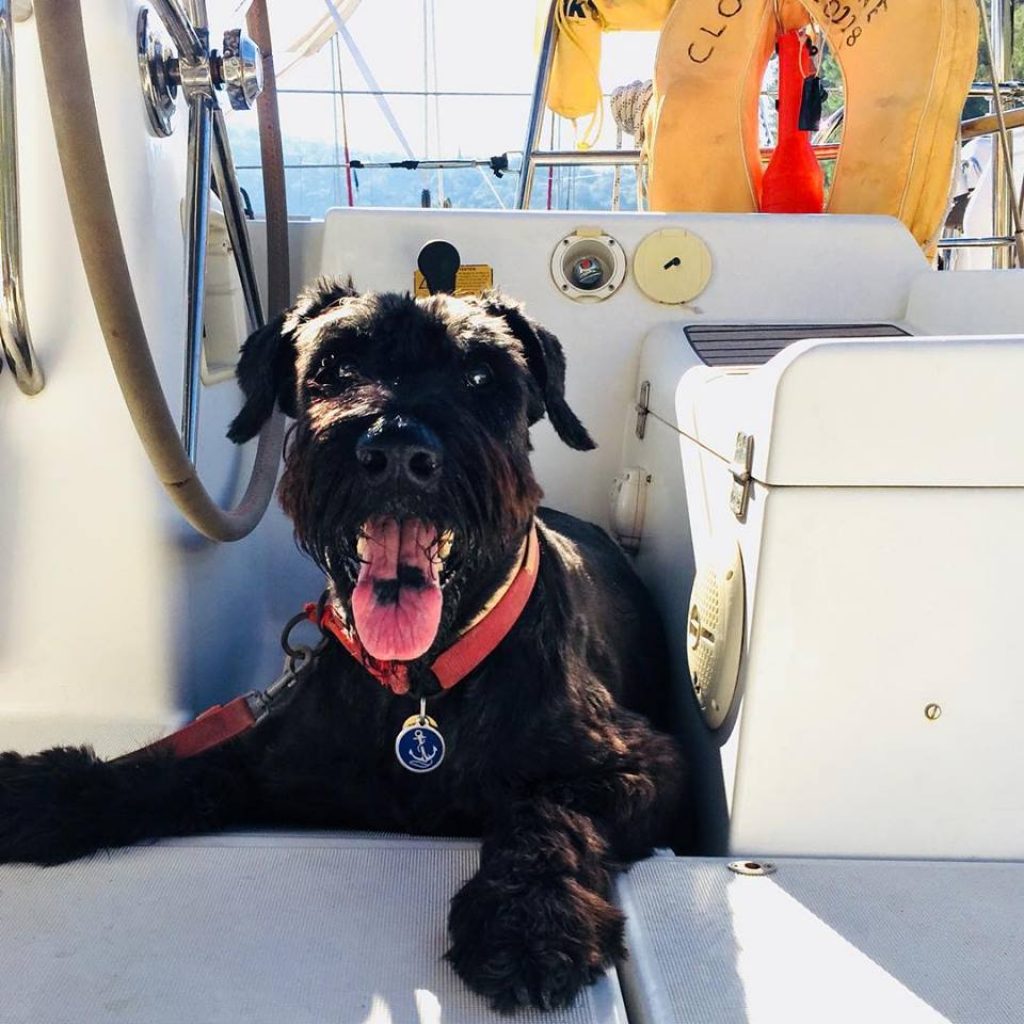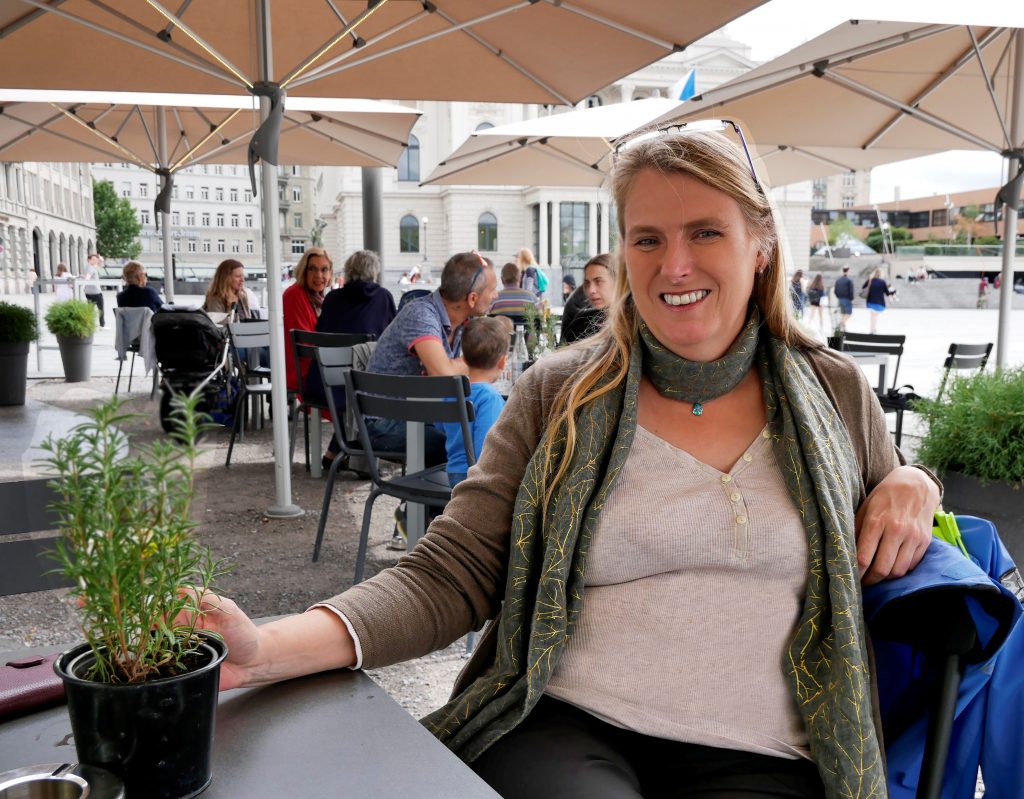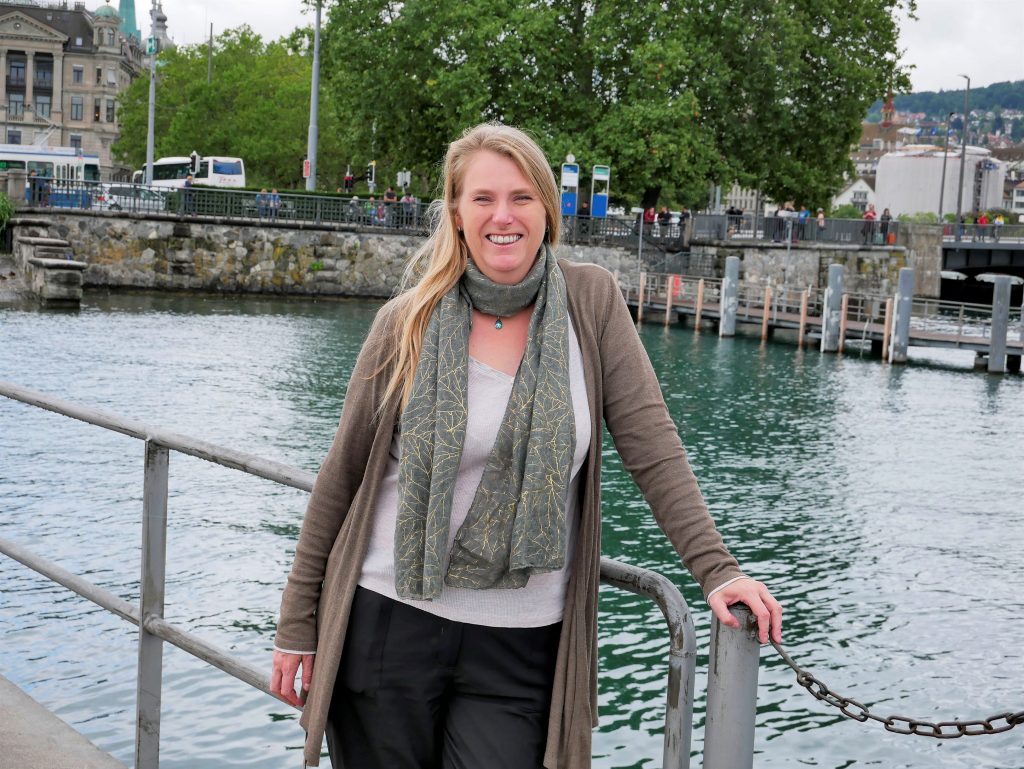How to build a successful beauty business? What qualities should a beauty expert have? Why…
Emma Gledhill
Founder of Cloud Nine Sailing and Shipwrite GmbH

How to build a business out of a hobby? How to earn money while travelling? What should you pay attention to before turning your passion into your job?
Emma Gledhill, founder of Cloud Nine Sailing and Shipwrite GmbH, has found out how to make the most of her life. She spends much of the summer in Greece where she offers sailing courses and holidays to her Swiss clients. Every winter she skis in the Swiss Alps and works as a translator and interpreter. In her spare time, she plays the tenor saxophone in a band. In this interview Emma talks about how she was pushed to make a life-changing career move, what is so magical about sailing, and why it is important to cooperate with competitors.
Emma, we’re meeting right after your return from the holidays. Were you on a sailing trip?
No, in fact this was the first actual holiday we’ve had in several years. My partner’s father had his 85th birthday, so we went to the UK. We spent a great day with the family and then did a tour around, visited several places, so we were real tourists in the UK.
And what does your usual summer schedule look like?
In summer we usually sail in Greece, where the season tends to run from about May to October. We have a 45-foot yacht there, so we go down to organize tours for our clients, hold qualification courses or leisure trips on the boat.
The possibility of combining holidays and work sounds amazing. How does it feel for you?
Well, it was always a long-term plan to spend 6 months in the mountains and 6 months on the water. But I’m still pinching myself because it was always “sometime in the future” then suddenly, I realized that this could be now! So I’m delighted I ‘ve been able to make it happen – “Make your dreams your to do list”, as an inspirational postcard I have says.
Seems like you managed to build your life in a way that many people dream of. But it wasn’t always like that, was it?
That’s right. For many years I worked as a freelance translator. I had a home office and completed all the work remotely. I think things changed after my marriage broke down a couple of years into a global financial crisis. Then just a few months later, in 2011, exchange rates dropped and suddenly, almost overnight, my income fell by 30 or 40%, as my major client was based in the eurozone. It was just getting silly: I was tied to my desk all the time, working more, earning less. My health was suffering as well, everything aching, eyes getting worse from spending too many hours at the computer.
When you get that kick in the back, you have to react. It was a case of what do I have to lose? Just do it.
Was it then that you decided to take a completely new direction?
Yes, I found myself thinking: what can I do to earn money without physically typing for 70 hours a week? What other skills do I have? I’ve always been passionate about sailing. For as long as I can remember, I have been sailing and messing around on boats since I was about six. Moreover, I had my professional sailing qualifications and had done my instructor qualifications by then. Somewhere around that time I attended an exhibition to promote my language services and thought, “Let’s see if anyone is interested in sailing as well.” I ended up with 1 sign-up for language services and 30 for sailing.
What a difference! What kind of services did you offer back then?
At that time, I only offered some sailing courses on Lake Zurich. Then I thought, “Hang on, I have all these other qualifications, why don’t I offer some theory courses as well?” And finally, I realized I could also offer sailing holidays in Greece, since I was going there to sail anyway.
Wasn’t it a little scary to start something completely different from what you’d been doing before?
The sailing wasn’t a problem for me, whereas continuing to be a full-time freelance translator in the same way as before was clearly no longer sustainable. When you get that kick in the back, you have to react. It was a case of what do I have to lose? Just do it.
So, you decided to try. How did you promote your services?
Pretty much the same way as we do now. We use every free form of advertising: social media, forums, networking, meeting people face-to-face. The only thing we find worth paying for is the Expat Expo, because it helps us to meet new people and make new contacts.
You mentioned Expat Expo. Does this mean that you focus mainly on expats?
I focus on teaching in English, but only because it is the lingua franca on the sea, nautical communication is in English. However, I deliberately do not focus on expats. In fact, about 50% of our clients are Swiss. They start with the Swiss qualification system, often find that they don’t like it so much and switch to the English system.
What are the differences between the Swiss and the English sailing qualification systems?
The Swiss system insists that you do a thousand nautical miles of experience just as a crew. Then you get your certificate for sailing on the high seas, and only then can you start training as a skipper. Whereas the English system is more practical from day one. You start skippering with very little experience, you are taught to understand your limitations, but you learn as you go. You are taking responsibility and are actively engaged in what’s going on. That contributes to a much more integrated crew.
Is that why the British qualification system became so popular?
Well, certainly the RYA (Royal Yachting Association) is probably the most widely recognized and highest rated qualification system in the world. Interestingly, in the UK obtaining this license is voluntary, there is no obligation to do so. There you’ve got 8-year-old kids, who are really good sailors. Or I have literally seen people sitting in a boat, with the steering in one hand and a “how-to-sail” book in the other. The whole idea is to actually get people on the water. The association fights to maintain this status, because they want people to want to get qualified. Whereas European countries tend to insist on obtaining a sailing license just like a driving license for a car.
The idea is to get you going as quickly as possible, because the quickest way to learn is to make mistakes.
Suppose I am a totally inexperienced person who would like to learn sailing. What should I do and how much time will it take to be able to sail alone?
On dinghies you can take RYA Level 1 and Level 2 qualifications, each lasting 2 days. So, after 4 days of practical training we reckon you’re safe to go out on a small open boat in fairly benign conditions. You are also at the stage when you can go out and learn for yourself. On larger yachts it takes a bit longer, a minimum of two 5-day practical courses on the sea with a 5-day theory course sandwiched in the middle. But this is a bare minimum; you should always know your limitations and you will be learning for as long as you sail, whether you are 8 or 80. This again is the beauty of the English system. The idea is to get you going as quickly as possible, because the quickest way to learn is to make mistakes, but with sufficient knowledge to minimize the risks. You must always remember you are in the natural environment. A lot of the time the worst thing that can happen is that you may get wet, but Mother Nature is very powerful and deserves respect at all times.
What levels of sailing education does your program include?
In Switzerland, we offer RYA theory courses. Some people take them purely out of interest, others because they need them as the next part of their qualification. And we offer practical RYA qualification training in warm Mediterranean waters, which is mainly held in Greece and occasionally in Gibraltar. We used to offer courses on Lake Zurich as well, but we stopped doing that because the winds here are too unreliable.
You say “we,” who are the other members of your team?
Well, in my life, everything happened simultaneously. I met my partner, Nick, about a year after my marriage broke down, just around the time that I was looking for something other than just translation. He also holds sailing qualifications, including as a dinghy instructor. On the yacht in Greece I am skipper and Nick is my highly experienced crew. We’ve been sailing the boat between just the two of us for years now, so we know exactly whose jobs are which and how it works.
The third member of the crew is the ship’s dog Heros, who is now 13 years old. He started sailing at the age of seven, and he absolutely loved it. On the rare occasions when I have to go down on my own, the locals, instead of saying to me “Welcome Skipper”, ask “Where is the dog?”
Photo: @funkyforty
This should make it feel like home. Haven’t you thought about living there all year round?
Sure, we have all the local knowledge, we know the people and feel part of the community. But my home is here, I am naturalized, I am Swiss. I have 3 passions in my life and I can’t quite give up any of them. One is languages, one is sailing, one is music. My music is here, I have been playing tenor saxophone in the Swan Big Band in Horgen for nearly twenty years. Plus, my skiing is here, my favorite mountains are here.
And what do you like most about sailing?
I just love everything about it. I like being on the water, I like sleeping on the boat. I like the unstable surface and the fact that you keep fit all the time, everything is moving so all your muscles are given a gentle workout 24 hours a day. I like getting into a harbor and sitting in a cockpit with the team, watching all the tourists walking past and looking at us jealously. I like to travel from one island to another and be in a different place every night. I like the ability to find a deserted bay, just drop the anchor, cook on board and lie on the top of the boat looking up at the stars.
Is that the feeling you want to share with your clients?
Exactly. I want to give people the opportunity to try sailing where the water is lovely and warm, the wind is good and reliable. And there’s no need to learn if you don’t want to, just sit back and enjoy the experience. Our tours are tailored to the wishes of our clients. If you just want to travel between the islands, or if you want to go to places you can only get to by boat, that’s absolutely fine. If you want to learn, we are happy to teach you. And if you are bitten by the bug, you can stick with us, come back to Switzerland, do your theory course, come again later to do the next practical course. So, you have continuity in education, continuity with the people you are dealing with. And I think it’s a pretty perfect combination.
Sailing is inherently collaborative. Probably the most dangerous situations on a boat arise when people argue.
Do you have competitors or companies in Switzerland that offer more or less similar services?
To my knowledge, nobody does the theory and the practical in exactly the way we do. There is another school that offers short courses for sea survival, first aid, maintenance, but they go to Scandinavia for the practical part. We have known each other for a long time, we offer different things and tend to complement each other.
So, you collaborate with your competitors?
Yes, sailing is inherently collaborative. Probably the most dangerous situations on a boat arise when people argue. Whenever something goes wrong and people focus on each other instead of on what’s going on.
About dangerous situations and mistakes: What are the most complicated things that can happen at sea?
Well, part of a skipper’s job is to think about anything that might possibly go wrong and devise a plan to handle it. But I think one of the worst things that can happen is when the wind gets up very quickly and the consequences of that. You’ve looked at all the forecasts, they all look great and then the weather does something completely different. That happens on the water a lot, so you have to be prepared.
Isn’t that also one of the reasons to sail: to feel the adrenaline and the power of nature?
Well, there is a saying: “The wind is never right, there is always too much or too little of it.” But sometimes it’s absolutely perfect and those are the days you live for. There’s nothing quite like it when you get the sails up, start sailing, turn off the engine and it’s quiet. It just never gets old, it’s magic.

Photo: @cloudninesailing
Does it still feel the same when you’re on the boat with people you barely know? I mean, you and your clients may have just met before starting a week-long tour.
Usually you get along well for a week. It is an enclosed environment, so people do have to get along, or at least make an effort. Maybe you’re not going to be going for drinks together every week when you come back, but on the other hand you may find new good friends. If you spend 2-3 weeks on a boat with someone, it is similar to spending 2 years with them on land.
Moreover, I have known people who come from a corporate background and they have said that sailing is the best management training they have ever had. This is because you have to get all your people to work as a team, you have to think of eventualities and possibilities of what could go wrong. If things do go wrong, you have to manage your people, you have to make sure that you give them the best jobs.
Be aware that when you make your hobby your job, it’s not purely a hobby anymore.
What motivates people to spend a holiday on a yacht if they have never done so before?
They want a good holiday in which they can relax, get away from things, turn off the phone, do something completely different. Such an experience may even change their understanding of life. You know, many people don’t appreciate how little you need to be happy. And it’s one of the things we are hoping to convey to people on a boat. Here you have somewhere to sleep, somewhere to cook. You are like a snail: you take your home with you wherever you go. What more do you actually need?
And it is a very eye-opening thing for many people who are bound by their financial commitments, corporate meetings, career expectations. But what for? I know many people who hit their 40s and 50s and realize that the corporate rat race is not what makes them happy. So, they have changed everything dramatically, started their own projects and found more fulfilling ways to work and live.
Based on your experience, what advice can you give to those who want to turn their passion into a profession?
One thing I would say is if you are sure you want to do it, just go for it. But be aware that when you make your hobby your job, it’s not purely a hobby anymore. For example, if I am in Greece and have no clients, I could go somewhere and say, “You know, it’s a bloody good restaurant here, let’s stay for a few days.” When I have clients, I can’t do that because I have committed to showing them many different places. In that respect, every job is a job. There will always be things you have to do, whether you like it or not. But at least you do it in a field you’re passionate about – and it’s quite a nice office!
What dos and don’ts are there for novice entrepreneurs?
Remember that your job is not only to do and deliver, but also to generate new business and communicate. It’s all a form of networking, whether face-to-face or online. Don’t go in with the attitude of “Give me business, place an order.” Go in to build relationships, because only then will you get people on side who might then go out to advocate for you. Be professional, be friendly, be natural, get others to want to talk to you. You are your best asset.
Thank you very much for this interesting conversation and useful recommendations! We wish you all the success with your projects!
CLOUD NINE SAILING CONTACTS
Learn more about Cloud Nine Sailing
Website: www.cloudninesailing.ch
Facebook: https://www.facebook.com/SailYSL/
Instagram: https://www.instagram.com/cloudninesailing/
Twitter: https://twitter.com/sailcloudnine














